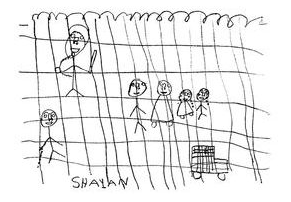In the long-term, the children could still need psychological intervention. Much depended on how well they were re-integrated into society and how connected to the community they became.
“The attitude of the Federal Government has to change,” Dr Newman said. Anxiety and symptoms of post-trauma stress order would continue until people had permanency. “The Government must make a sincere effort to reform the law. There can be no progress until we actually reverse that.” The children could not get better until they had security. “They don’t feel safe,” she said.

Advertisement
This drawing by Shayan Badraie, at 6, shows Shayan and his sister crying, with their parents. The van at bottom right is the ambulance that would take Shayan to and from Westmead Children's Hospital, when he needed to be rehydrated because he would not eat or drink properly. Top left is a guard with a baton. Bottom left is a detainee bleeding where he has cut his wrist. All along the top is the razor wire that sits across the fences at Villawood. Courtesy, Chilout (Children Out of Detention).
Discuss in our Forums
See what other readers are saying about this article!
Click here to read & post comments.
28 posts so far.
About the Author
Judy Cannon is a journalist and writer, and occasional contributor to On Line Opinion. Her family biography, The Tytherleigh Tribe 1150-2014 and Its Remarkable In-Laws, was published in 2014 by Ryelands Publishing, Somerset, UK. Recently her first e-book, Time Traveller Woldy’s Diary 1200-2000, went
up on Amazon Books website. Woldy, a time traveller, returns to the
West Country in England from the 12th century to catch up with
Tytherleigh descendants over the centuries, and searches for relatives
in Australia, Canada, America and Africa.